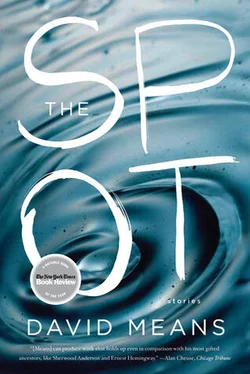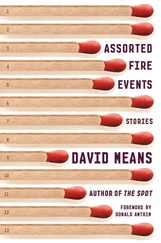“Now let’s backtrack a little. The nurse, who presumably has been through many of these moments with many other patients, most likely came into the so-called sweat chamber to offer assistance, to help you in one way or another, or to remove the electrodes, and in seeing your hand over Gunner’s mouth she understood your predicament and sympathized with it and with the boy’s predicament, too — perhaps your own more so than the boy’s — and at that moment she did not judge you as harshly as you’d like to think, but was actually waiting for you to speak, and in hearing your anger, when you did speak, and within it your deep, almost Jobian fear, felt her own helplessness before all the illness she has faced, as you were saying. Bald cancer heads, forlorn eyes, tears, kids suffering at the deepest level. Kids cheery and chipper against the saddest odds. Kids with that disjointed misunderstanding of their own place and status, not only healthwise but otherwise, too. Kids bucking themselves up heroically. Clearly, just going by the fact that you continue to mention what her Mona Lisa face seemed to be saying, almost obsessively, it seems to me, it becomes evident that you were turning to her as a soothsayer, and maybe that might mean, and here I propose this only as a theory, a useful one — perhaps, perhaps not — that she, too, felt herself to be unwillingly put into a shamanic position; no, let’s correct that and say an oracular mode. Let’s say she felt that her face might — from your point of view — be seen as an oracle, and let’s say that that might explain the strange expressions she presented, if they really were strange.”
Cavanaugh imagined all of the above as he drove back over the Hudson while Gunner slept in the backseat with his head lolling to one side and his tiny mouth open around his own breath, and, down below, the river fretted with bits of white chop as the first hard wind of the fall drove down from the north and cut past Hook Mountain on its way to the city. As he drove, he began to cry, openly and with stifled guffaws, the way a man must cry when he is faced with the future, any future, a good one or a bad one, and after he has sat alone in a room with his child, waiting for sweat to collect so that he may know something about what is to come, some exactitude in the form of a diagnosis; he cried the way a man must cry when he’s driving, keeping both hands on the wheel and his eyes wide open through the blur, and he cried the way a man must cry when he is exhausted from being up deep into the night while his boy coughs up almost unbelievable quantities of phlegm, clearly succumbing to a disease process — as his doctor called it — that at that point was indeterminate; he cried for himself as much as for his son, and for the world that was unfolding to his left, an open vista, the gaping mouth of the river, which at that moment was flowing down to the sea, hurrying itself into the heart of New York Harbor. He was crying like a man on a bridge — suspended between two sides of life, trapped in the blunt symbolism of the spans, and atop the floating pylons that sustained the decks of reinforced concrete — while his son slept soundly, unburdened now, it seemed, when Cavanaugh looked back at him in the mirror, and afloat on his own slumber. Not at all sick, or diseased, and free from whatever torment the future might offer up. By the time (three minutes later) that Cavanaugh was exiting off the thruway and driving down Main Street (six minutes later), past the stately trees unfurling their fall brilliance, he had collected himself and was clear-eyed and in a new state. He wasn’t a man reborn at all. Not even close. That would come much later, after the second test, and when the results were in, conclusive and hard, no nonsense in the statement they made. That would come (he imagined) when he gave himself over to the fact that salt moved chaotically in and out of certain cells, and that Gunner’s body would forever confront certain facts: mucous blockages in his lungs and pancreas, and frequent infections. But for now, as he entered the town on a beautiful fall day, the diagnosis was somewhere off in the remote future, and he was alive and dealing with the moment at hand, which included his own actions in the sweat room, and the failure of his set design for the convention scene, and he felt himself growing calm before the sweet presence in the backseat, which came to him in the form of a soft snore, a little clicking sound that accompanied each exhalation, and then, finally, a small groan as the car settled over the curb of the driveway (eight minutes later) and came to a stop, and then another slight sniff as his boy awoke (one minute later), roused by the silence, the lack of road noise, and opened his eyes and blinked, and then said, “Are we home? Are we home now, Dad?”
Where else to begin but beneath the dining room table, where she’s hiding, dazed and alone, tormented by fear and loneliness, lost to time (it seems), most certainly to be forgotten? The annals of history won’t record this lonely moment while the house cracks in the heat, aches high up in the rafters, snaps along the joists; the genuine linoleum in the kitchen glistens oily to the touch, the trees and grass sway in the wind off the river, and she hunches down beneath the table, where she at least feels safe, listening to the wind as it lifts through the trees to make a hushed sound and then depletes itself so that a dog’s bark, husky and dry, can arrive from far off, and then even farther away a soft hooting sound — someone calling — and then another dog, giving a sharper, more precise bark while she examines her knees, worn to white threads, and then extends her legs and says aloud as she touches her shins and ankles, You’ve got good long legs, fine, fine legs. She leans back and looks at the underside of the table, the battered legs and feet (Who left this grand artifact here?), and then, looking up, sees the words GRAND RAPIDS stenciled on the underside of one of the leaves.

How much despair is inherent in lifeblood, to put a name to it and yet to avoid speaking of it; they were that deep underground — and the underground was ethereal, nonexistent, and supplanted by their own hopes. It was all vainglory. It was all desire to overcome some inner chink in the armor — or so they thought. Light seemed to seep through the cracks; that’s how it felt — as if they were able to read each other’s minds. She could look into Byron’s face; she could see it in his eyes, his wide brown eyes, nothing like doubt, nothing like that at all, but some immutable glint of fear. It is fear that will destroy us, he hinted: One wrong move and we’re doomed, and so when we approach, it must be with the utmost certainty and firmfootedness, not a bit of room to spare, not an inch one way or another. The line on the map indicated the route to the mall. The Brinks truck — heavy and swaying under its armored weight — followed the route weekly. In back rooms, monies were counted with great care, then poured into canvas sacks, sealed, tagged, and hefted out into the raw pure daylight and loaded. One could imagine the bags coming out beneath the broad blue sky and seeing the light of day for a moment before being borne up into the dark, cavernous hold, piled up against other bags, the weighty perplexity of cash compiled against cash; the sluggish movement of the truck as it eased out of the parking lot; the shielded windows, the portals for shotgun muzzles, the heavy-block weight, the reinforced tires — the imponderable protective bulkiness of the truck, so fragile and delicate as soon as it was open to air. That space between point and point, through which the bags had to travel; that in itself, of course, was the weak spot, open to human error; the guns belted into holsters, snapped tight, officious, square-handled; that moment when the money made its way through the morning was the caesura, the quest; the main goal, the main purpose of all the planning, was to find a way into that open air, to coordinate their place in time and space with that of the Brinks truck so that they might, with the simple prompting and the pointing of weapons, provoke the security men, the workers, the hired hacks, to peaceably hand over the bags of money without being shot. That was the original plan laid out; the proviso was that lives would be spared and that it would be a clean, neat operation that went from step to step with the swiftness of exacting precision, an almost mechanical process, but of course it was also brutally clear that one misstep and lives would, as they say, be taken; so it was imperative that they strike at the moment when the cash was nakedly open, when the bags were moving, exposed. The mall had been staked out. She parked there one afternoon, watching from a slouch: ladies moving in and out of the stores, bearing bags, a few men going into Sears for wrenches; one woman with sagging hose, pulling her child along with a stretched arm — overburdened with too many demands, her hair up in a beehive, looking threadbare — swatted the behind of her little boy to move; this woman was evidence, she thought, of what the system does; the system creates burnout, the stress of consumption; the system tears into the ankles; it puffs the ankles up and sends you wobbling along in high heels.
Читать дальше













